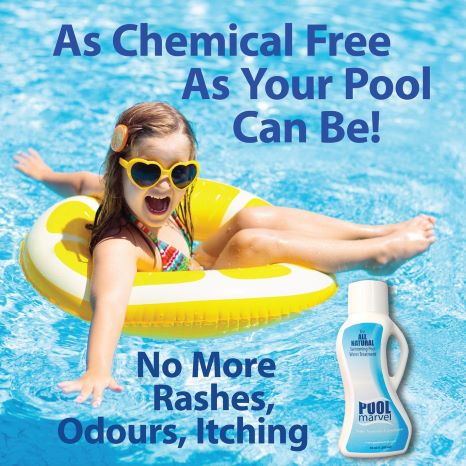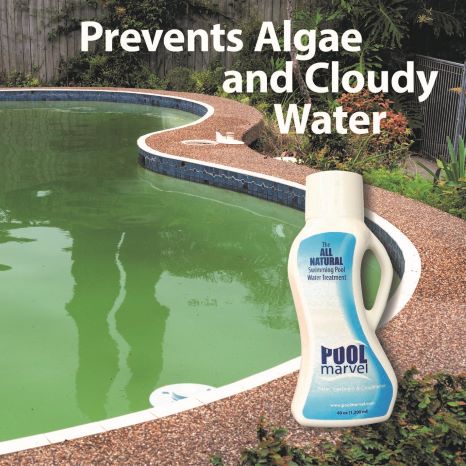
Enzymes
Every organism naturally contains enzymes, which play a key role in disintegrating organic matter by accelerating biological processes. Since they’re highly effective at decomposing oils and other contaminants, they’re ideal for treating pool water.
Besides being safe for humans and other mammals, enzymes provide plenty of benefits, including easier and more cost-effective pool maintenance.
What Are Pool Enzymes?
Enzymes are specialty pool chemicals added to the pool water to fix a pool issue or make pool maintenance more manageable. Available in a liquid form and typically sold in 1-litre bottles or smaller, enzymes for pools are poured around a pool’s perimeters and work alongside pool sanitizer.
Although they break down contaminants in pool water, they do not kill pathogens, which is why chlorine or other pool sanitizers are still necessary.
What Do Pool Enzymes Do?
Like other catalysts, enzymes speed up chemical reactions of other substances without being destroyed or changed during the process. Typically globular proteins, enzymes help break down and remove organic waste in a pool’s filter, around the waterline, and in the skimmer.
Enzymes move freely through the pool water and collect organic matter at the active sites. The enzyme creates an enzyme/substrate complex upon interaction with organic material. Once the reaction is complete, the enzyme can perform the reaction again.
Various conditions affect the catalytic abilities of enzymes – such as temperature, pH changes, water activity, and ionic strength. This is why a suitable enzyme for your pool environment must be chosen.
What Are The Benefits Of Pool Enzymes?
Improve Filter Run Cycles
Enzymes break down non-living organic waste before it has the opportunity to build up in the pool filter, leading to a more efficient pool filter system. Fewer pool filter backwashes are necessary, and the pool filter media stays cleaner longer.
Easier Pool Maintenance
Enzymes help remove waterline scum build-up as well as prevent it from returning. Not only is scum build-up unsightly, but it can be time-consuming to remove. If a pool service crew is utilized to complete pool cleaning, they don’t have to work as hard manually or for as long to remove the scum rings.
Enzymes also help keep the pool filter cleaner for longer, requiring less time spent to complete the task by the pool owner.
Produce Cost Savings
Pool enzymes help produce cost savings in various ways:
Water Savings
Because enzymes break down non-living organic waste, there’s less opportunity for it to accumulate in the pool filter – and the number of pool filter backwashes is greatly reduced.
Filter Media Savings
A pool filter’s job becomes easier when it has to filter less organic waste. The pool filter media stays cleaner for longer and doesn’t need to be replaced as frequently.
Chemical Savings
Enzymes help remove organic waste, freeing chlorine to sanitize against pathogens. As a result, less chlorine is needed to keep your pool sanitized.
Time Savings
Less time is needed to clean pool water, leaving the pool owner with more opportunities to enjoy their pool.
Maximize Chlorine Efficiency
Enzymes remove some food sources consumed by contaminants and help prevent algae and bacteria growth. This reduces the amount of chlorine needed to maintain desired levels. In turn, less chlorine helps reduce chlorine odours and irritation to the eyes and skin.
Support Water Quality
Pool enzyme treatments such as the Pool Marvel Water Treatment and Conditioner contain natural enzymes extracted from plants to manage water quality problems.
The enzymes help maintain water clarity and create a cleaner swimming environment when used as part of a regular pool maintenance routine. The water quality improves, including the water’s feel, taste, and smell.
Choosing The Best Swimming Pool Enzymes
Selecting the right enzyme product depends on your pool’s capacity and the primary purpose of your pool.
Enzymes for spas are different than enzymes for pools because of the vast difference in water environments. Specific enzymes are needed to manage the different microorganisms in spas and warmer water conditions. Pools require enzymes that combat inorganic waste and other harmful environmental microbes, such as pollen and bird waste.
Some enzyme products offer numerous functions, including destroying a wide range of inorganic waste. Choosing one like Pool Marvel Water Treatment and Conditioner helps you enjoy the most significant number of benefits..
What Types Of Enzymes For Pools Are Available?
Blended Enzymes
Blended enzymes are one of the primary classifications of enzymes, with the specific goal of reducing the number of fats and oils. They reduce the time needed for pool maintenance and generate cost savings while creating a clean, oil-free pool waterline.
Broad-Spectrum Enzymes
The second classification of enzymes, broad-spectrum enzymes, are manufactured differently than blended enzymes. They’re chemically separated through the process of effervescence and help increase the rate of chemical reactions in pools.
Broad-spectrum enzymes easily and continuously destroy organic matter, including sunscreen, oils, and bather waste, until no pollutant remains in the pool water. As a result, these enzymes are more powerful in treating pool water.
When To Use An Enzyme Pool Cleaner
Every swimmer leaves approximately 455 grams of inorganic matter in a pool each hour, such as sunscreen, oils, and bather waste. Because of this, you should use enzymes as part of your regular pool maintenance routine – alongside the use of a pool sanitizer. An enzyme pool cleaner is recommended if you regularly encounter scum lines and floating oil.
Each enzyme product is different, but many require only one weekly dose. It’s also recommended that pool owners use enzymes each occasion the pool receives servicing. For optimum results, always follow label instructions for your enzyme pool cleaner.
Commercial pools typically contain more pollutants than residential pools and will benefit from using enzyme products twice as often as residential pools.


